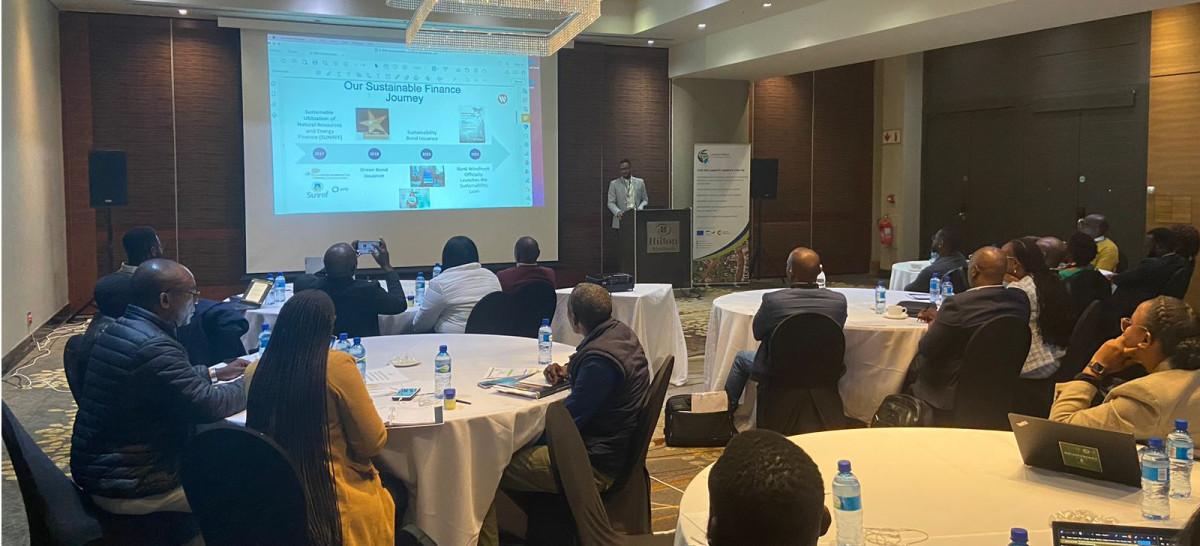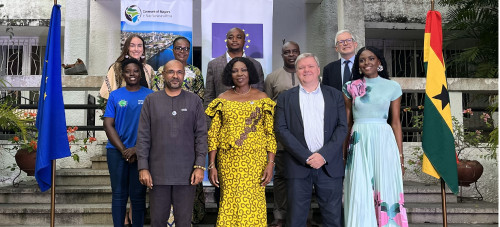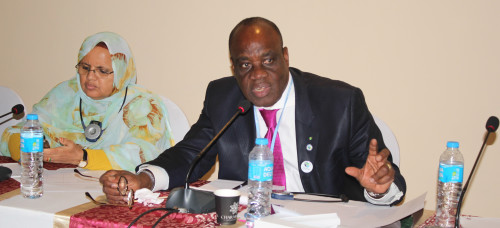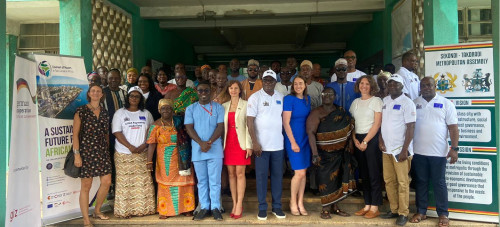Breaking barriers: channelling climate finance to local government
Published: 8 Aug 2023
Climate Finance

In Africa, 277 billion USD must be mobilised annually to meet 2030 climate goals. However, at current levels, at least nine times more climate finance is required to meet this need. The Covenant of Mayors in Sub-Saharan Africa (CoM SSA) Secretariat, in partnership with the Association of Local Authorities in Namibia (ALAN), brought financiers, local and national governments together at its first in-person climate finance learning lab in Windhoek, Namibia, last month.
Dr Samuel !Oë–Amseb, President of ALAN, expressed interest in "seeking a long-term relationship with CoM SSA in the form of a cooperation agreement, to promote capacity building for elected and appointed officers of local authorities in Namibia."
Cities are first responders in the fight against climate change, and unlocking climate finance is key to implementing catalytic projects in African cities and towns. In Namibia, climate change is already increasing the frequency and intensity of droughts and floods, wildfires and coastal erosion. While many cities and towns in the country have developed plans, and have identified key projects to mitigate and manage the threat of climate change, many still require additional capacity to develop these projects to a point where they are able to access climate finance to make these plans a reality.
Through CoM SSA, 56 city-level projects across the sub-Saharan Africa region have been supported, representing a total investment volume of EUR 436 million. Although this is a significant achievement, much more needs to be done to attract the scale of finance needed to build resilient and low carbon infrastructure in Africa, to meet the continent’s development needs. Currently housed within climate plans developed with support of the CoM SSA initiative, are over 300 projects needing support. These African cities that have invested heavily in the development of such plans, must be supported in overcoming the challenges they face in gaining access to the finance needed to implement these plans. Financers typically operate at a national or regional level, and funds rarely reach local governments directly. According to CoM SSA Regional Mayors Forum Chairperson and Global Covenant of Mayors for Climate and Energy (GCoM) Board member, Yawo Winny Dogbatse, Mayor of Kloto I (Togo), “African cities only receive around $3 billion a year in climate finance, amounting to less than 1% of global urban climate finance." Furthermore, local level projects need to have sufficient scale and ambition, often requiring working beyond one local government’s boundaries. City-level projects require specialist technical expertise to develop, which smaller/ intermediate local authorities often lack.
The CoM SSA climate finance learning lab was designed to bridge the gap between local governments and key role players needed to unlock climate finance, and it served as a platform to unlock climate finance solutions for Namibian projects.
At this learning lab, CoM SSA and ALAN brought together Mayors and technical staff from eight local government councils in Namibia, representatives from the Ministry of Urban and Rural Development, and the Namibian Association of Local Authority Officers (NALAO), as well as a number of CEOs and commercial and development financiers, which included the Bank of Windhoek, Development Bank of Namibia (DBN), Environmental Investment Fund (EIF), and Namibia Nature Foundation (NNF). Further support and project funding options were also presented by the European Commission and the GCoM. Representatives from the following local governments were among the 40 people who attended the learning lab:
- Tsumeb Municipality
- Rundu Town Council
- Walvis Bay Municipality
- Tsandi Village Council
- Outjo Municipality
- City of Windhoek Municipality
- Otjiwarongo Municipality
- Katima Mulilo Town Council

- Hands-on support to develop concept notes for projects that had already been identified. These concept notes were discussed directly with financiers. The learning lab approached this in a way that identified opportunities for peer learning, cooperation and project ‘pooling’ between cities.
- Presentations from financiers on funding sources and project development support available to local governments. This gave the local governments an understanding of the resources available to them for implementation.
- Discussions between local governments and financiers in terms of what expert advice and feedback is needed to better package projects and relevant funding sources.
Despite varying in size and location, many commonalities and key trends emerged amongst the project concepts developed during the learning lab, particularly on urban sustainability issues such as waste and water management. The innovation displayed in the projects was a highlight, with many local governments linking clean energy and low-carbon technologies with sustainable water supply, or promoting circular development approaches in waste management. Over 30 projects were identified by the Namibian councils in participation, and a great need for investment into climate smart infrastructure was shown. This learning lab provided an opportunity for local governments and financiers to form meaningful connections and networks, and at the same time allowed cities to learn from one another as frontrunners, with a discussion on how they could guide their compatriots who are at earlier stages in their project funding journey. Amongst the projects presented at the training, special commendations were awarded to:
- The Otjiwarongo Municipality for the most innovative, unique and ambitious project,
- The Katima Mulilo Town Council for the most environmentally conscious project, and
- The Tsandi Village Council for the most socially inclusive project.
Following this successful climate finance training learning lab, further assistance will be provided by CoM SSA to the cities to develop their concept notes with Namibian-relevant financiers, and in co-creating a Namibian financiers roadmap to be used for future project development.
CoM SSA will draw on the lessons learned from this learning lab so that the initiative continues to provide scaled technical support to local governments throughout the sub-Saharan African region. Sufficient technical support is crucial in developing quality projects and suitable financial mechanisms for African cities to access the finance they need to implement their climate change plans. CoM SSA intends to host more climate finance training learning labs in the future with cohorts of CoM SSA signatory cities.
This learning lab was informed by the CoM SSA Climate Finance course, which is available, for free, to all in English and French.





